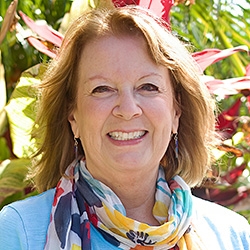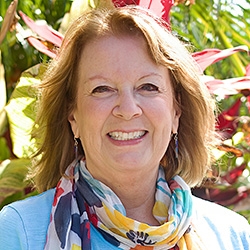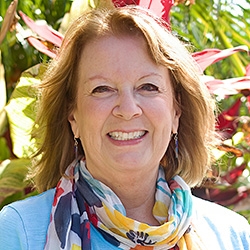

Search Results: work
-
We've seen how Nonviolent Communication can provide immense personal healing, but questions have arisen on whether it can also contribute to meaningful social change. Roxy Manning believes it can, on both the individual level and the systemic level. NVC for Social Change teaches how to navigate these challenging social issues with love and compassion. By leveraging the depth of understanding that NVC provides, we can then begin to generate equitable processes in our networks and our communities.
-
Do you yearn to step forward in leadership, but know you're holding back? Clinical psychologist, organizational consultant, and speaker, Roxy Manning, PhD, shows us that more than external factors, its our internal beliefs and fears that provide the main barrier to moving forward. She does this by taking us through three myths of leadership, and weaves in anecdotes to illustrate how tapping our unique (often lesser recognized) qualities, can be the way forward we've been seeking. Learn ways to move forward, even if at first it appears that (1.) others can "do it better", (2.) you need to be more prepared, or even if (3.) the material you're conveying isn't so original (and has been used many times).
-
How do you know when you’re projecting disowned parts or replaying old relationship dynamics? It’s hard to know for sure, but if you find yourself upset or shutting down and unable to have a dialogue in which you can speak clearly about your feelings and needs and empathize with the other’s feelings and needs, there is likely a projection. The stronger your reaction, the more likely you are projecting.
-
What could be, more often than not, overlooked when we think about or represent NVC or Marshall Rosenberg's work? This article busts some commonly held ideas and approaches to NVC. It challenges us to widen the lens of what it really means to be "life-serving", or speaking and hearing the "language of life". And it also speaks to how thinking can deepen feeling and relatedness...
-
How can we live up to our true potential, a life filled with relationships and experiences that truly meet our needs? In this article, Mary offers us a way to bring about inner transformation that can lead to seeing ourselves, others and life differently -- for greater agency, empowerment and choice.
-
When Anita's sister reveals that the Ku Klux Klan broke into her home and dragged her out into a field towards a burning cross, Anita's commitment to nonviolence is challenged. Here, Miki highlights practices and lessons from her story of inner struggle -- including an insight about how, even in extreme polarization, our freedom and healing is wrapped up in others' freedom and healing.
-
Trainer tip: If you are in a relationship (whether personal or work related) that you are not happy with, consider talking to the other person in an effort to connect about both your needs. Talking about it doesn’t guarantee that you will like the resolution, but not talking about it guarantees continued unhappiness. Read on for more.
-
Physical distancing is opportunity to creatively to meet your needs in new ways. In this containment, with very few cues from others and the environment you now have a rare opportunity with less external distraction to rethink what's truly supportive -- and make significant changes to the less noticable habits of mind, standards and "should's". Applying questions and noticing certain symptoms can support. Read on for more.
-
Trainer Tip: Sometimes I wish others would make it easy for me to live my values. If other people would just do their part, I wouldn’t have to work so hard at doing mine. Can you relate? However, if I support peace in the world, this means I act peacefully because it’s important to me, not because it’s important to others. Identify your most important value today. Then live it. Notice how healing this can feel even just after one day.
-
We can shift from being absorbed and identified with our inner chatter and feelings to being the space of awareness of these things. Observe your breath. Then observe your mind generating thoughts. Next, feel sensations of your body, particularly the difficult ones. Now, connect with the underlying energy of needs. Ask your unconscious mind for universal needs words related to what you now notice, think and feel.
-
Control may help us feel safe in an unpredictable, unsafe, wild world. Wanting control may be a response to shielding ourselves from feeling fear and being aware of our vulnerability. The more we insulate from fear, discomfort, and vulnerability, the more we are cut off from aliveness; we can become more anxious, and depressed. The more we control the more we are disconnected from empathy and care. With aliveness come joy, peace, love, awe.
-
When faced with someone’s grief for the world, how do you engage with them in a way that is informed? In this session, Kristin suggests exploring what they might be grieving… what they’re afraid of losing… and what it is that they love.
-
When we have an inner conflict, how can we bring ourselves closer where we want to be? Miki explains about how we can deepen our self understanding in a way that can transform our own reactivity, urges, and false either/or views -- so that we can bring in more presence, choice, and options.
-
This exercise will help you resolve situations in which you have two needs which seem to be in conflict with each other, transforming inner conflict into peace.
-
Miki demonstrates how to work with judgmental thinking, offering a two-step process to shift from right/wrong thinking about our disagreements to a more open-hearted state of being.
-
See how consciousness evolves and links to NVC using Wilber’s stage development ideas.
-
Anger can result in violence or in a movement towards positive change. We can see this happen in the push for racial justice. When you perceive anger as a form of violence your nervous system becomes activated. Your perspective narrows and old conditioning can take over leading to overwhelm, defensiveness, hatred, or violence. Read on for four ways to to respond to our own or others' anger in a way that mobilizes desired change.
-
Before you make a request you can connect fully to a time when your need was met. Notice how your request feels and sounds different from this place of aliveness. Excitement about meeting a need implies confidence and trust about moving forward together. Offer an invitation to find strategies that work for both of you.
-
In this Life Hack, we're going deeper into self-empathy with a simple guided reflection that you can work through. This will be followed by a short exercise with a fill-in sheet led by Gesine and is something you can come back to as you wish.
-
With this exercise you'll choose an experience you had with someone where your needs were not met. You'll work with the related feelings, judgements, values, and feeling the fullness of the need even though it was not met, plus any sadness that may arise.

Quick Links
Subscription Preferences
Stay In Touch!
Looking for ways to keep up with NVC Academy news, get special offers, free resources, or words of inspiration? Here are five ways to stay engaged:



















